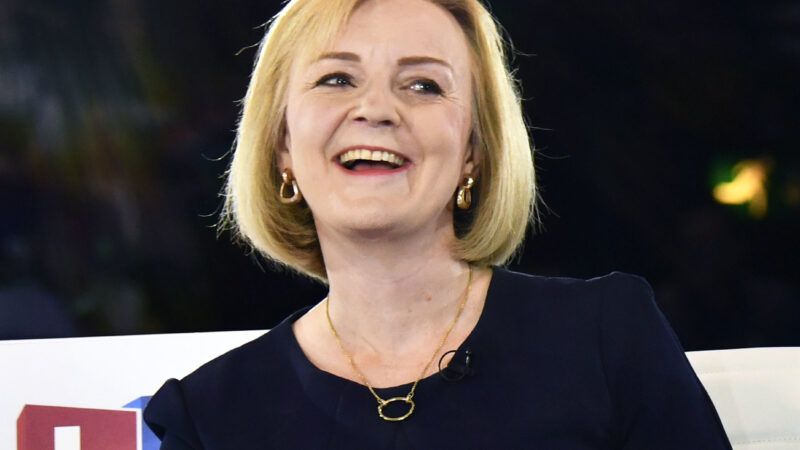Liz Truss Is Britain's Next Prime Minister. Should Libertarians Be Happy?
Only time will tell if Truss reverses the big spending style of her predecessor.

After a bruising six-week contest, the result is in: Liz Truss will be Great Britain's new prime minister. An ambitious Conservative politician who served as Boris Johnson's foreign secretary throughout the Ukraine crisis, Truss will officially take office on Tuesday. But will her arrival in Downing Street bring an end to the big-state, big-spending style of her predecessor?
There are certainly reasons to be optimistic. Within the Westminster village, Truss has long been regarded as a torchbearer for liberty—a reputation that stretches back to her days working at various small-state think tanks. Since entering Parliament in 2010, she has been a member of the Free Enterprise Group—an informal caucus of Tory members of Parliament (M.P.s) looking to push the party in a more free market direction.
While she served in the David Cameron and Theresa May governments, it was her appointment to Boris Johnson's cabinet—in summer 2019—that made her a household name. As trade secretary, Truss was responsible for delivering on the good bit of Brexit—jetting around the world to sign tariff-busting trade deals. She was good at it too, quickly securing ambitious agreements with Australia and Japan.
Her internationally-focused brief also provided a convenient pass during the dark years of COVID-19 lockdowns. While her ministerial colleagues led finger-wagging TV broadcasts announcing authoritarian new rules, Truss chose to prioritize Zoom negotiations with her counterparts in the U.S. and India. Long seen as a savvy social media user, her Twitter timeline was noticeably light on the "stay at home" propaganda being churned out by Downing Street.
After Johnson's downfall came Truss' leadership campaign—with its determined focus on tax cuts. She immediately pledged to reverse the tax hikes pushed through by Boris Johnson's administration, including the sharp increase in payroll taxes. When her opponent, Rishi Sunak, fretted about increasing the fiscal gap and the impact on inflation, Truss hit back, insisting that tax cuts were necessary to reverse Britain's economic slump.
But will Liz Truss' premiership put Britain back on track to a smaller state? Some things aren't that simple. While Boris Johnson certainly embraced big government, he was also responding to a fundamental shift in British political gravity—one which makes small-state conservatism a difficult sell.
Like other Western countries, Britain possesses a rapidly aging population. It's a ticking time bomb that has already seen state spending on health care and pensions surge to unprecedented levels, making tax cuts more difficult. As those pampered retirees tend to vote Conservative, their influence over its policies is enormous. It's why pensioners are just about the only people in Britain getting a pay raise in line with inflation.
Throughout her think tank days, Truss took aim at this growing culture of affluent entitlement. One of her most influential reports dared to call for a rethink of the "winter fuel payment," an unconditional handout of between £250 and £600 ($288 and $691) made to every single retiree in Britain (one in four of whom is now a millionaire). Truss' assessment was spot on: Why should taxpayers subsidize the fuel bills of rich households?
Many of Truss' best ideas will encounter similar resistance. To her credit, Truss has long been an advocate of relaxing Britain's punitive planning laws, which would make it easier to build much-needed homes and energy infrastructure. But such ideas are toxic with backbench Conservatives, whose voters—high on inflated house prices—will punish them for greenlighting the smallest development. When Michael Gove, a Conservative minister with a knack for pursuing radical reforms, tried to take them on, he ended up flushing his plan down the toilet (literally).
It doesn't help that the pandemic has raised the expectations of voters, who now expect the government to step in at the first sign of trouble. Witness the growing demands for the state to pick up the tab for Britain's rapidly escalating energy bills. But what do the Conservatives expect after they spent £69 billion ($80 billion) on paying workers to stay at home? The Treasury has already bunged everyone in Britain more than £550 ($633) to pay their bills. Now half of Tory voters want full state ownership of the energy industry.
To be fair, Truss isn't afraid to stand up for her principles. As trade secretary, she fought nobly against the lobbying of farmers who wanted to maintain strict tariffs on Australian food imports. But her more protectionist colleagues won the battle—persuading Boris Johnson to hand farming unions an effective veto over any future trade deals. Next time, of course, it will be Truss who makes the final decision.
With a looming recession and an election due before the end of 2024, our new prime minister is going to have to move fast. Let's just hope that it's in the right direction.
